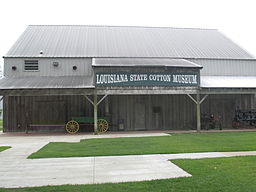Lake Providence, Louisiana
| Lake Providence, Louisiana | |
| Town | |
|
Louisiana State Cotton Museum in 2013
|
|
| Country | United States |
|---|---|
| State | Louisiana |
| Parish | East Carroll |
| Elevation | 105 ft (32.0 m) |
| Coordinates | 32°48′19″N 91°10′46″W / 32.80528°N 91.17944°WCoordinates: 32°48′19″N 91°10′46″W / 32.80528°N 91.17944°W |
| Area | 3.6 sq mi (9.3 km2) |
| - land | 3.6 sq mi (9 km2) |
| - water | 0.0 sq mi (0 km2), 0% |
| Population | 3,715 (2015) |
| Mayor | Robert Amacker (D) |
| Timezone | CST (UTC-6) |
| - summer (DST) | CDT (UTC-5) |
| Area code | 318 |
|
Location of Louisiana in the United States
|
|
| Website: Town of Lake Providence | |
Lake Providence is a town in and the parish seat of East Carroll Parish in northeastern Louisiana, United States. The population was 5,104 at the 2000 census but declined by more than 20 percent to 3,991 in 2010. The town's poverty rate is approximately 55 percent; the average median household income is $16,500, and the average age is 31. The town shares its name with the oxbow lake of the Mississippi River, also called Lake Providence.
The Lake Providence area first opened for European-American settlement in the late 1830s, after Indian Removal. New settlers drained the cypress swamps and cleared the land for cultivation. By 1861, at the start of the American Civil War, the region consisted entirely of large cotton plantations worked by thousands of slave laborers.
The town of Lake Providence began with the arrival of the Union Army in the spring of 1862. Under the direction of General Ulysses S. Grant, Lake Providence was established as a supply depot and base of operations for the Vicksburg Campaign. The soldiers dug a canal between the Mississippi River and Lake Providence. The area was called "Soldiers' Rest", but Grant subsequently moved his troops south for further temporary residence at Winter Quarters south of Newellton in Tensas Parish. As freed or runaway slaves swarmed into the camp at Lake Providence from surrounding plantations, the population quickly soared from a few hundred to several thousand. What began as a simple military supply camp quickly transformed into a "city of negroe refugees.".
...
Wikipedia



